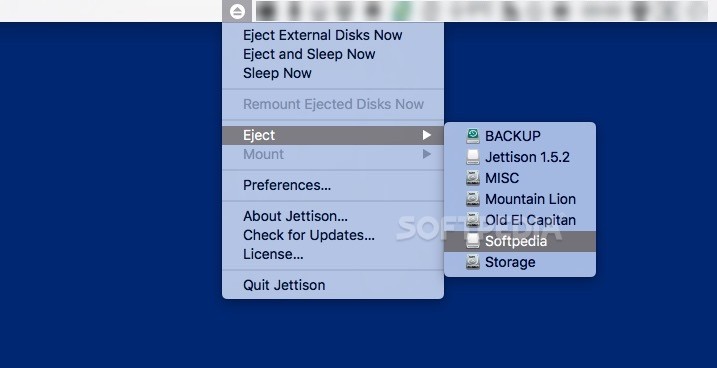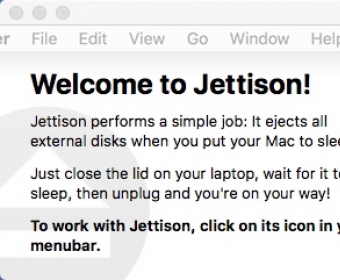- Jettison For Mac Alternatives
- Jettison For Mac Alternative Download
- Jettison For Mac Alternative Software
- Jettison For Mac Alternative Keyboard
TL;DR
macOS 10.15 Catalina will not run 32-bit Mac applications. At all. Once you upgrade to Catalina, those apps won’t even launch.

This has been the cleanest, easiest Hackintosh install I have ever done as is the closest to a real mac I have had in terms of operation. Don't install Jettison as it should not be needed. Hope it works for you - I bought Windows but have found it horrible to use. Edited to add Incidentally I don't use UseKernelCache on my machine. How to survive without Windows or Mac. There is a good alternative to Lightroom and Aperture in RawTherapee. We are not yet brave enough to jettison Windows and OS X but we feel the day may. Jettison eliminates the hassle of manually ejecting external drives before you put your MacBook to sleep. With Jettison, you just close your MacBook, unplug and go! Limitations: 15-day trial.
To prepare, I wrote Go64, a free application that scans your system for 32-bit apps and shows them all in one place, with version and website information to make it easier to assess whether you need to update or look for an alternative.
You can download Go64 here.
The longer story
After Mojave started warning about 32-bit apps needing to be updated, Ronald Leroux, who does all the French localizations of my software, pointed out that there wasn’t really a good way to check for and update 32-bit apps on your system. The built-in System Information app does work, but it’s certainly not the most user-friendly, nor is it necessarily complete.
Over a weekend last fall, I put together a straightforward little app to scan for 32-bit applications and show them in a list. It took a fairly simplistic approach, and worked fine but was no more thorough than what System Information provides. Still, it was much easier to use, so I figured I’d release it in the Mac App Store. Then came the task of trying to get it approved: App Store Review rejected it because it asked for permission for the entire disk so it could scan for apps. That wasn’t something I could fix or work around. So I shelved it – there were higher priorities at St. Clair Software, plus dealing with the App Store always seems to ruin my day.
Fast forward to WWDC 2019, when Apple confirmed that Catalina definitely won’t run 32-bit apps. Howard Oakley at the Eclectic Light Company had been doing some deep-digging and highlighted a number of issues with 32-bit app checking. He wrote his own exhaustive scanner that searches for them, but it’s slow and still not very user-friendly. I dusted off Go64 and figured I’d turn it into a more complete solution.
“It’ll only take a couple of days…” – famous last words uttered by nearly every software developer at some point in their careers.
As they say, the devil’s in the details, and dealing with the vagaries of what goes on inside applications got interesting. Go64 leverages Spotlight to compile a list of executables, but then does a deep dive into each 64-bit application to check for any helper apps, frameworks, services or plugins that might not be 64-bit. While I knew this could be an issue, Howard’s work highlighted just how common it is to have a mix of executables bundled within apps. Most of the time, it’s just for expediency, and developers do the proper juggling to run the correct one, but how’s a user to know? So Go64 does a bunch of checks to look for common methods, and if it still can’t make sense of things, errs on the safe side and flags the app with a little caution icon.

Clicking on “More Info” gives you the whole scoop:
This, of course, led to more complexity. As a developer, I don’t want to be bugged by hoards of people asking whether my app is Catalina-compatible just because some stupid “Go64” app noticed I include a 32-bit helper to deal with ancient Quicktime videos. So Go64 updates its internal “Ignore this warning” list periodically from the St. Clair Software website – that way it can inform users that even though the app contains 32-bit code, it’s compatible.
So developers, if your app contains 32-bit code but is Catalina-compatible, contact me with the bundle ID and version number of the app and I’ll add it to the list so Go64 gives users this message instead:
And to everyone else, I hope Go64 turns out to be useful for you. I certainly had a lot more 32-bit apps sitting on my Mac than I thought!
Again, you can download Go64 here.
'Tis the season for dusting off the crystal ball and playing a Nostradamus of telecom. This contribution to the seasonal lineup of stories predicting the immediate outlook for the sector arrives two or three weeks later than most others, and it was nearly discarded.
Partly, that is because last year seemed to prove the futility of soothsaying attempts. If nothing else, 2020's horrors showed that predictions are generally as secure as a log cabin at the base of a smoldering volcano.
Jettison For Mac Alternatives
Rather than build on top of that growing fire hazard, why not turn the format upside down and predict the non-events of 2021? A piece that rules out certain developments might not go up in smoke quite as fast as any world-in-2020 outlook written this time last year, just weeks before an unforeseeable virus erupted. Nor would it be so devoid of risk that it proved worthless. In January 2020, prophesying that a pandemic would not scorch the planet would have seemed like a fairly safe bet.
So here goes:
Open RAN scaled an Everest of inflated expectations in 2020. This year, it will not avoid a descent into the Grand Canyon of disillusionment. The politicized technology, adored by protectionists and Huawei bashers, sprinkles the elixir of interoperability over the radio access network (RAN), allowing operators to combine products from different suppliers (not previously possible) and make use of general-purpose equipment.But various engine problems mean it will not take off as quickly as some analysts expect. Those include performance shortcomings (it's rubbish outside rural communities where 3G is still considered cutting edge), intellectual property concerns (it risks infringing patents held by companies not part of its club) and doubts over cost (is it really cheaper than a traditional network?).
Yet by far the biggest brake on open RAN was identified by Robert Finnegan, the CEO of Three UK, during a Zoom call with reporters before Christmas: Most operators have already decided on their 5G suppliers and some (including Three) have already had to jettison Huawei at significant expense. They are not about to undergo another costly swap-out for several years, and possibly not until the dawn of 6G.
5G will not justify its existence in 2021 even as the rollout bill soars, with US operators likely to splurge more than $90 billion on new midband spectrum licenses in the latest auction fiasco. While Ericsson is probably right to forecast more than half a billion 5G connections by the end of this year (up from an expected 220 million in 2020), no consumer seriously needs 5G and few businesses currently have much interest in its high-speed, super-reliable, low-latency sales pitch. Yes, 5G will generate billions in economic value over the next few years, but 4G would likely generate almost as much if 5G did not exist.Jettison For Mac Alternative Download
Worse, the telecom sector will probably not even be among 5G's main beneficiaries. Operators face huge investments and scant prospect of additional revenues, while outside China equipment vendors foresee little growth from sales to service providers, their main addressable market. This year will be one of deepening existential angst for operators as they ponder their diminished role in the ecosystem despite all their investments in new connectivity standards.
Jettison For Mac Alternative Software

Jettison For Mac Alternative Keyboard
| 2015 | 2016 | 2017 | 2018 | 2019 | Sep-20 | |
| AT&T | 281,450 | 268,540 | 280,000 | 268,220 | 247,800 | 234,630 |
| Verizon | 177,700 | 160,900 | 155,400 | 144,500 | 135,000 | 133,200 |
| Deutsche Telekom (DT) | 225,243 | 218,341 | 217,349 | 215,675 | 210,533 | 227,584 |
| Sprint | 30,000 | 28,000 | 30,000 | 28,500 | 27,000 | N/A |
| DT, Sprint combined | 255,243 | 246,341 | 247,349 | 244,175 | 237,533 | 227,584 |
| Telefónica | 137,506 | 127,323 | 122,718 | 121,853 | 117,347 | 113,392 |
| Orange | 156,191 | 155,202 | 151,556 | 150,711 | 146,768 | 142,501 |
| Telecom Italia | 65,867 | 61,229 | 59,429 | 57,901 | 55,198 | 52,480 |
| BT | 102,500 | 106,416 | 105,787 | 106,742 | 105,344 | 101,752 |
| CenturyLink | 43,000 | 40,000 | 51,000 | 45,000 | 42,500 | 39,000 |
| Swisscom | 21,637 | 21,127 | 20,506 | 19,845 | 19,317 | 19,026 |
| KPN | 14,078 | 13,530 | 13,275 | 12,431 | 11,248 | 10,194 |
| Total | 1,255,172 | 1,200,608 | 1,207,020 | 1,171,378 | 1,118,055 | 1,073,759 |
| Difference | N/A | -54,564 | 6,412 | -35,642 | -53,323 | -44,296 |
| Percentage change | N/A | -4% | 1% | -3% | -5% | -4% |
| Source: companies, Light Reading. | ||||||
Related posts:
— Iain Morris, International Editor, Light Reading